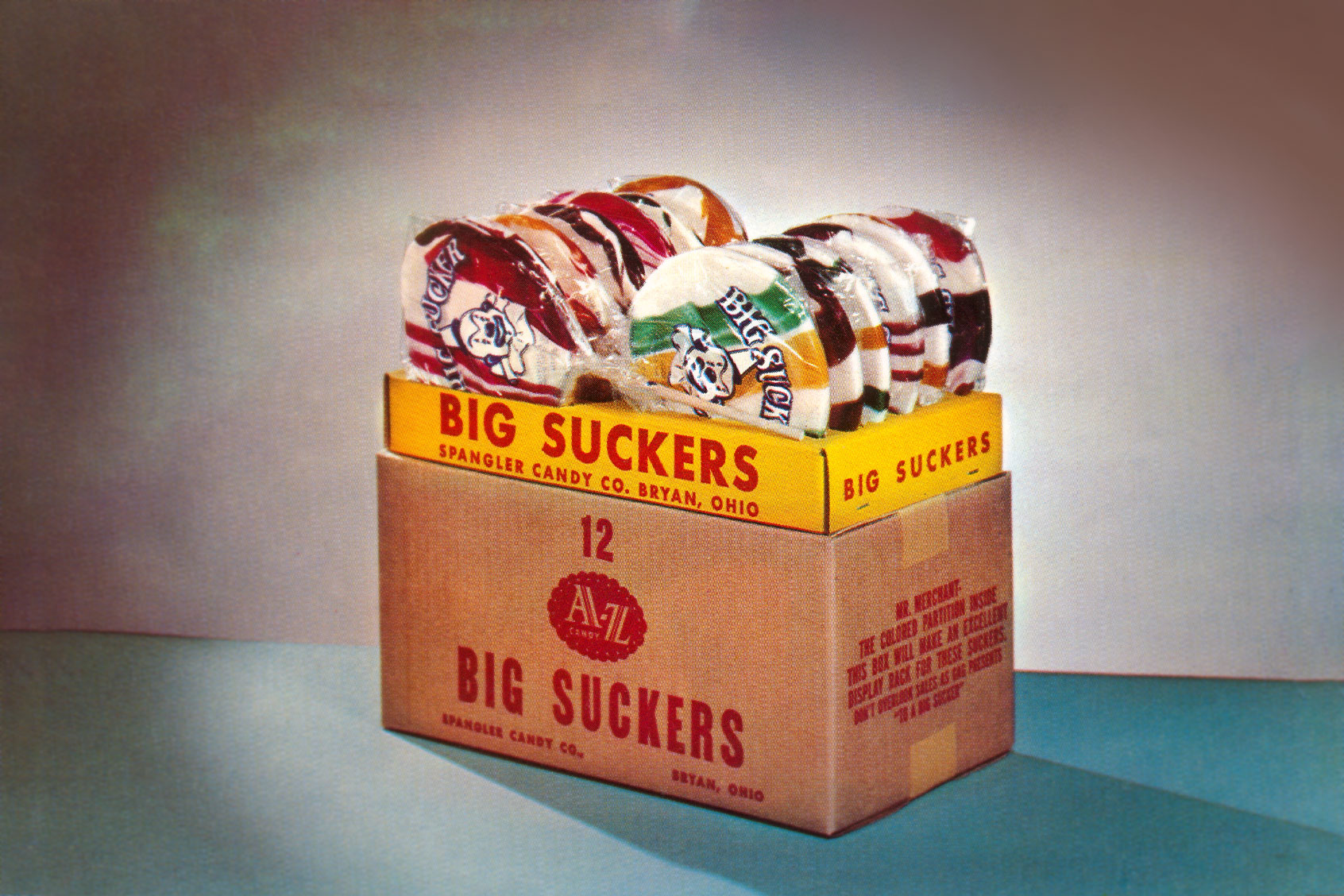In Bryan, Ohio, candy is king. Set about 60 miles west of Toledo, the little town of about 8000 is home to Spangler Candy Company, makers of all sorts of favorites, from Dum-Dums and candy canes to Sweethearts, Necco Wafers and Circus Peanuts. There’s even a water tower in the center of town painted to look like it’s held up by the long-lived lollipops.
Employing about 14% of the town, Spangler has been around for well over 100 years. A baking soda manufacturer before finding success in candy, Spangler has been churning out millions upon millions of nostalgic favorites every day for decades. (They make 12 million Dum-Dums per day alone.)
Though Spangler didn’t create all its candies — some of its brands, like Necco and Dum-Dums, were acquired along the way — it trafficks in legacy and in memory. Who among us doesn’t have a go-to Dum-Dum flavor? Or a specific memory about where you got the suckers as a kid? Maybe a grandparent introduced you to the company’s Bit-O-Honey treats, or you buy Sweethearts for your kids to this day because that’s what your parents always did for you.
“The candy industry is a nostalgic industry,” said Spangler CEO Kirk Vashaw. “People get used to the candy they like growing up and they tend to just like it forever. There can be new flavors and new innovations, but those new things tend to come and go. We’ve always found that our most popular flavors are the ones that have always been there, like butterscotch and root beer Dum-Dums or anything with a classic fruit flavor.”
Evan Brock, Spangler’s VP of Marketing, says he’s been partial to watermelon Dum-Dums his whole life, and for good reason. Kids are often introduced to the Spangler brand through the suckers, though they grow into the company’s other brands — and their more “mature” flavors — as they age. In fact, while much of our relationship with candy comes from when we’re kids, recent surveys have found that about half of adults say they eat more candy as a grown-up than they ever did as a child. Hence those 12 million Dum-Dums a day, I guess.
Take Necco Wafers, with their signature (and rare) clove flavoring. Brock says those can be more of an acquired taste, even if you’ve tried and disliked them as a kid. “You can come back to them later in life,” he said. “When your taste buds change and realize, ‘Hey, I really like these things and I have good memories of sharing them with my family.’”
We need your help to stay independent
Vashaw has also noticed more consumers experimenting with flavors, and especially vintage flavors, in recent years. But while Spangler has dabbled in new, “exciting” flavors like Dragon Fruit and Birthday Cake Dum Dums, it’s found that any tweaks it makes to classic options get flagged by consumers. “We’ve thought about making some of our traditional flavors better or more vibrant,” Vashaw said. “But people don’t like when we mess with their flavor, even if they prefer the newer one in a blind taste test. So we introduce new flavors, but we won’t change the existing flavors, even if we think — and a taste test thinks — it could be better. People notice.”
While Dum Dums account for a good portion of Spangler’s sales, the company also makes about half the candy canes you see on store shelves each holiday season. (Half of which, Vashaw notes, are never actually eaten and are instead used for decoration.)
The company makes so much candy, between all of its brands, that it supports an army of smaller manufacturers around the United States: the companies that make the sucker sticks in North Carolina and New York, the Wisconsin company that makes Dum Dum wrappers, the midwestern companies that make the cardboard for the company’s boxes, the sugar beet growers up in Michigan.
"We introduce new flavors, but we won’t change the existing flavors, even if we think — and a taste test thinks — it could be better."
The company even uses locally-grown corn for its non-high-fructose corn syrup, meaning that numerous businesses in the Bryan area benefit from Spangler’s success.
“For every manufacturing job we have at Spangler, it supports another 10 up and down the supply chain,” Vashaw said. “We have 200 suppliers in the state of Ohio alone, so when we grow our business as a family company, we know it’s not just a benefit to us, but to the whole region’s economy.”
While Spangler staffers don’t get to eat fresh suckers straight off the production line (Vashaw said his grandfather always told him “not to eat the profits.”), they do get a discount on candy at the SpanglerWorld store and museum in downtown Bryan. They also get good pay, good insurance, paid vacations and holidays, and a membership to the local YMCA. There’s even a wellness clinic on site, should employees want to pop in for a flu shot or a check-up before or after a shift.
While it might feel hokey to call Spangler a feel-good American success story, it’s about as close to one as you can get in corporate America these days. The company clearly values its employees and customers and says it only takes risks when it doesn’t have to bet the proverbial farm. While other nostalgic food brands have gone wild with gimmicks or leaned into flashy marketing, Spangler just keeps plugging away, making candy that everyone in America has adored for basically their entire lives. It doesn’t get much sweeter than that.
Read more
about this topic


